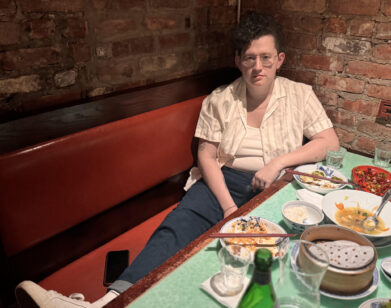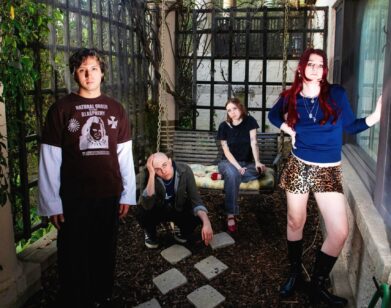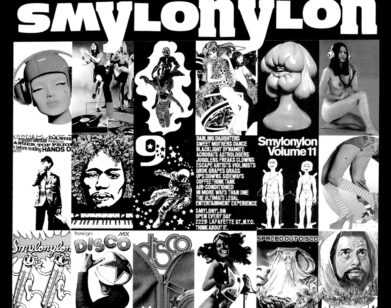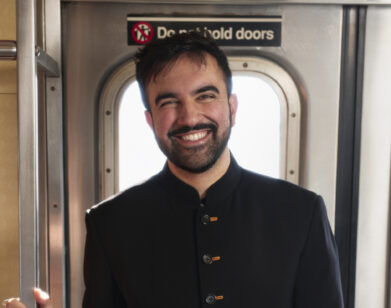Chad Harbach’s Three-Letter Words
The offices of n+1, one room on the fourth floor of a converted warehouse in DUMBO, rattle every time an F train passes by. Chad Harbach sits in the center of the space at a wood table eating a salad as he apologizes to an intern; he’s worried he accidentally kicked her out of her seat. Harbach, an accomplished author in his own right—Amazon named The Art of Fielding the Best Book of 2011—is the editor of the collection of essays MFA vs. NYC, which sets out to come to some kind of consensus about the divide between the two spheres of contemporary fiction, nonfiction, and poetry. The essays in the book are split into sections representing all facets of the experience of writing or working with writing. It’s practical and accessible, although the world that it sets out to describe is a daunting one. We sat down with Harbach to discuss program fiction, the economics of writing, and whether or not anyone is safe.
MICHAEL HAFFORD: This is a very practical book. Was the intention: “We’re going to give you a portrait of what it’s like in the 2010s of what it’s like to be a working writer?”
CHAD HARBACH: Yeah. The idea for the book grew out of my piece [“MFA vs. NYC,” originally published in n+1 Issue 10]. I think my piece is fundamentally about the material conditions of trying to be a writer. Every person has to make a living. And how do writers do that these days? When you think about that, you can offer speculation about how that might affect the work and the craft—what gets written and what gets published. “How do writers get by in the 2010s?” was kind of the basic question of the book.
HAFFORD: Do you see commonalities in program fiction in the ways that the critics of program fiction see? Like, people all trying to be Raymond Carver is a common refrain.
HARBACH: You do see people trying to write like Carver. [laughs].You do see it in a program. The other really fabulous book about MFA program is Mark McGurl’s The Program Era. He basically says, “Writers have been entangled in the university for hundreds of years. We should stop trying to make this distinction between writers in the university and writers who somehow live ‘real’ life outside of the university.” To me, that’s a basic premise. To me, MFA programs have become so prevalent that even if you haven’t gone to one, the writers you read have gone to them. If you have friends who write, they’ve gone to one. I think in my essay I say, “We are all MFAs now.” The whole MFA culture is pervasive. What I don’t think you can do is look at a book and say, “This person had an MFA or they don’t.” I defy anyone to actually do that with any accuracy. There, I think this idea of “program fiction” is unscientific or un-analytic. You can’t actually say, “This is program fiction and this is not program fiction.”
HAFFORD: I guess I want to ask the reverse question: Do you see the New York publishing world producing or selecting a certain kind of writing? The knock on MFA programs is they produce sort of formulaic “action, memory, action, memory” fiction. Is there a corresponding trend?
HARBACH: In the very broad way, I think we are not living in a good moment for any kind of difficult fiction. The pressures of the publishing industry have something to do with that. In the ’60s and ’70s, you had kind of experimental post-modernists achieving a certain—not massive popularity—but being relevant and well-known. I think that in the past 20 years, that’s really fallen away. There’s a real pressure towards readability. In the broadest strokes, that’s the trend.
HAFFORD: Why do you think that is?
HARBACH: As recently as the ’60s, ’70s, or even the ’80s, fiction was seen as a resistance to pop culture—presented itself in opposition to pop culture and TV and mass entertainment and whatever. I think for complicated cultural reason, there’s been a shift so that fiction has—instead of presenting itself in opposition—tries to compete, in a way, in terms of entertainment value. It attempts to retain the ancient virtues of fiction while trying to do this worthy task of trying to grab people’s attention in a world of divided or distracted attention. I think that a lot of fiction has gone the route of trying to grab people instead of attempting an oppositionist strategy or abandoning what was an oppositionist strategy or a kind of difficult modernism or post-modernism.
HAFFORD: Do you think that’s a good thing?
HARBACH: I guess I probably think it’s a neutral thing. There’s always been great fiction of both types, of course. A lot of modernism or post-modernism, you could describe in terms of fiction trying to compete with film and TV and with the Internet. In a way, there’s a kind of looping back to the 19th century with the novel as a certain other kind of entertainment, which isn’t bad, because the 19th century was a pretty great time for the novel. On the other hand, there’s value in that resistance and difficulty too. Those are some of my and probably your favorite books as well. I think they’re both valuable and they can be combined in the same book. I don’t know if it’s good or bad. Maybe it’s neither.
HAFFORD: This book seems like it could be really scary. The MFA students writing seem to feel like they’re going to be locked out of publishing, the publishing people feel some anxiety about their place in the world, and the teachers… In Diana Wagman’s essay, she describes this sort of anxiety-fueled experience as a teacher. And that’s presented as the safe goal of the MFA world. Do you feel like anyone is safe?
HARBACH: No one is safe. [laughs] It depends what you mean by safe. If you mean economically safe, that’s why people want to become tenured MFA professors. You get a job like that and that gives you a measure of fiscal safety. Of course, there are costs to that because now you have an actual job teaching all the time and that involves a substantial amount of work. If you really want to be writing all the time, you’ve had to sacrifice some of your freedom for that security. But yeah, underneath that tenure system, there are so many MFA graduates who want to teach and who are severely underemployed. Bouncing around between adjunct jobs, teaching comp, just not being able to get a job at all. Now that there are more than 10 times as many MFA programs as there were in the ’80s, there are a lot of graduates of these programs and now there are thousands and thousands of MFA graduates every year. Those people are not going to find… It can run as a kind of pyramid for a while, with more and more programs coming into being for these people to teach at. More and more undergraduate workshops for these people to teach, but that stops at a certain point. In basic terms, it’s always been really hard to make a living as a writer. It’s probably exactly as hard right now as it always has been. What I think is a myth is the idea that it used to be easier and that it’s gotten harder. I think that always it’s been really fucking hard. People talk about the ’20s and ’30s when Fitzgerald could write stories for The Saturday Evening Post and get paid a lot of money for these short stories. Which is true, but Fitzgerald—
HAFFORD: —was the best writer of his generation—
HARBACH: —and he never had any money. And his books sold what today would be considered a very small number of copies, and the publishers took all the money. There have always been reasons why it’s not a good strategy for making money to become a writer. I think it’s equally as hard now as it always has been.
HAFFORD: There’s this notion of ambition throughout the book. Maybe with the exception of George Saunders and Lorin Stein’s interview, there’s a theme of: “If I just get this next thing, I’ll be okay.” Did you notice that?
HARBACH: Yeah. That’s the nature of the job of being a writer. You write a book, whether it’s good or bad, whether people love it or hate it, you always go through that process and then you’re back at zero. And you’re like, “What’s the next thing gonna be?” Artistically, that question is built in. It’s also reflected economically. If you’re a writer of books, you get paid for that book, you’re like, “Okay, what’s the next thing I’m gonna do?” There’s two pieces in the book by agents. Of course, for them it’s the same thing. They sell a book and then they’re like, “What’s the next thing I’m gonna do?” You’re not a company that made a new squirt bottle and you can just sell the squirt bottle for the next 30 years. The whole industry is built around these unique objects.
MFA VS. NYC IS OUT TOMORROW.







